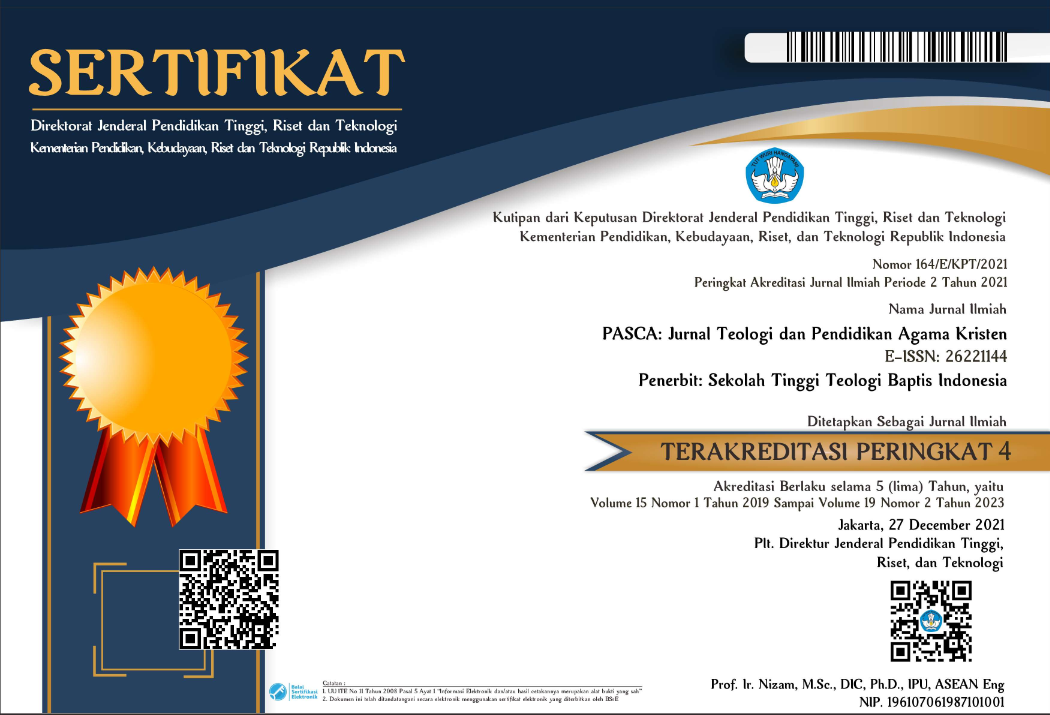Implementation of Project-Based Learning Using Recycled Materials to Improve Learning Outcomes and Teamwork Attitudes in Christian Religious Education for Grade 5 at Immanuel Christian Elementary School Semarang
DOI:
https://doi.org/10.46494/psc.v20i2.368Keywords:
Project Based Learning, Recycled Materials, Learning Outcomes, Cooperative Attitudes, Christian Religious EducationAbstract
This study examines the learning process of Christian Religious Education for Grade 5 at Immanuel Christian Elementary School in Semarang, which faces challenges such as students scoring below the school’s Minimum Competency Criteria (KKM) of 75, inadequate learning facilities, low student collaboration skills, the dominance of lecture methods, and the absence of teaching modules and visual aids. The research utilized a qualitative descriptive method with a classroom action research approach developed by Kemmis and McTaggart (1998), conducted during the 2023-2024 academic year. The study consisted of two cycles. In the Pre-Cycle phase, 8 out of 18 students scored below the KKM. In Cycle 1, the students’ average scores improved, with three students still below the KKM, and significant improvements were observed in lesson preparation. Cycle 2 showed further progress, with pre-test results reaching 70% and post-test results achieving 90%. Students' teamwork attitudes improved from 62.2% in Cycle 1 to 83.3% in Cycle 2, with enhancements in aspects such as cooperation, communication, adaptability, and responsibility. The Project-Based Learning (PjBL) approach received positive feedback from students, teachers, and parents. The use of recycled materials made the content more engaging and memorable for students. It can be concluded that PjBL is effective in improving learning outcomes and teamwork attitudes in Christian Religious Education. Recommendations include improving learning facilities, such as access to the internet, libraries, and laboratories; encouraging innovative teaching strategies; and conducting further research on the application of PjBL in other subjects or schools with different characteristics, as well as exploring the role of technology in supporting PjBL.
References
Arafah., Usnul Hayati; Kurniadi Saifuddin; Kaharuddin. “Meningkatkan Keterampilan Kolaborasi Melalui Model Pembelajaran Project Based Learning Dengan Alur Merdeka Di SMA Negeri 1 Soppeng.” Jurnal Pemikiran Dan Pengembangan Pembelajaran 5, no. 2 (2023): 555–59.
Arikunto, Suharsimi. Dasar-Dasar Evaluasi Pendidikan. Cetakan 3. Jakarta: PT. Bumi Aksara, 2021.
Darmawan, I Putu Ayub, Ruat Diana, Maria Lidya Wenas, Anggi Parenli Lauren, and Karnawati Karnawati. “Teachers’ Ability to Implement Digital Media-Based Learning during Pandemic at Christian Elementary Schools in Ungaran.” In Premiere International Seminar on Engineering Chemical and Biological. Medan: AIP Publising, 2024.
Fazri, Agus. “Model Pembelajaran Project Based Learning Dalam Meningkatkan Hasil Belajar Dalam Aspek Psikomotor Dan Sikap Pada Mata Pelajaran Jaringan Dasar Untuk Siswa Kelas X.” Jurnal Inovasi Dan Teknologi Pendidikan 1, no. 1 (2022): 140–44.
Hayati, Usnul. “Meningkatkan Keterampilan Kolaborasimelalui Model Pembelajaran Project Based Learningdengan AlurMerdeka Di SMA Negeri 1 Soppeng.” Jurnal Pemikiran Dan Pengembangan Pembelajaran 5, No 2 (2023). https://doi.org/https://doi.org/10.31970/pendidikan.v5i2.512.
Hutabarat, Oditha R. Model-Model Pembelajaran Aktif Pendidikan Agama Kristen SD, SMP, SMA Berbasis Kompetensi. Cetakan 1. Bandung: Bina Media Informasi, 2005.
Ketut Ayu Lola Monika, I Nengah Suastika, Dewa Bagus Sanjaya, Sariyasa. “PENERAPAN PROJECT BASED LEARNING BERBASIS KEARIFAN LOKAL TRI HITA KARANA MENINGKATKAN SIKAP GOTONG ROYONG.” DE_JOURNAL (Dharmas Education Journal) 4, no. 1 (2023): 7–15.
Koppi, A J. Academic Cultur, Flaxibility and The National Teaching and Learning Database. Australia: New Technologies in Teaching and Learning, University Of Sydney, 1998.
Lestariningrum, Tutik Alfiana dan Anik. “Penerapan Metode Proyek Untuk Meningkatkan Ketrampilan Sosial Anak Dalam Bekerjasama Pada Anak Didik Kelompok B2 Di Tk Kreatif Zaid Bin Tsabit Kecamatan Nglegok Kabupaten Blitar.” Jurnal PINUS Vol 1 No 3 (2015): 206.
Mubarak, A. Zaki. Desain Kurikulum Merdeka Belajar Untuk Era Revolusi Industri 4.0 Dan Society 5.0. Cetakan 1. Yogyakarta: Zakimu.com, 2022.
Satria, Rizky, Pia Adiprima dkk. Panduan Pengembangan Projek Penguatan Profil Pelajar Pancasila. BADAN STANDAR, KURIKULUM, DAN ASESMEN PENDIDIKAN KEMENTERIAN PENDIDIKAN, KEBUDAYAAN, RISET, DAN TEKNOLOGI REPUBLIK INDONESIA. BADAN STANDAR, KURIKULUM, DAN ASESMEN PENDIDIKAN KEMENTERIAN PENDIDIKAN, KEBUDAYAAN, RISET, DAN TEKNOLOGI REPUBLIK INDONESIA, 2022.
Sugiyono. Metode Penelitian Kualitatif. 4th ed. Bandung: CV. Alfabeta, 2021.
Untung Rahardja, Sudaryono. Statistik Deskriptif Teori, Rumus, Kasus Untuk Penelitian. Cetakan 1. Tanggerang Selatan, Banten: APTIKOM, 2023.
Wajabula, Christina Martha, I Nyoman Sudana Degeng, and Dedi Kuswandi. “Kontribusi Metode Bermain Untuk Meningkatkan Aktivitas Belajar Dan Hasil Belajar Anak Sekolah Minggu.” Evangelikal: Jurnal Teologi Injili Dan Pembinaan Warga Jemaat 5, no. 1 (2021): 27. https://doi.org/10.46445/ejti.v5i1.320.
Zaluchu, Sonny Eli. “Strategi Penelitian Kualitatif Dan Kuantitatif Di Dalam Penelitian Agama.” Evangelikal: Jurnal Teologi Injili Dan Pembinaan Warga Jemaat 4, no. 1 (January 31, 2020): 28. https://doi.org/10.46445/ejti.v4i1.167.
Published
How to Cite
Issue
Section
Copyright (c) 2024 Joan Silva Setyowati, Karnawati, Tjie Fu Sien
PASCA: Jurnal Teologi dan Pendidikan Agama Kristen is licensed under a Creative Commons Attribution-ShareAlike 4.0 International License.



























